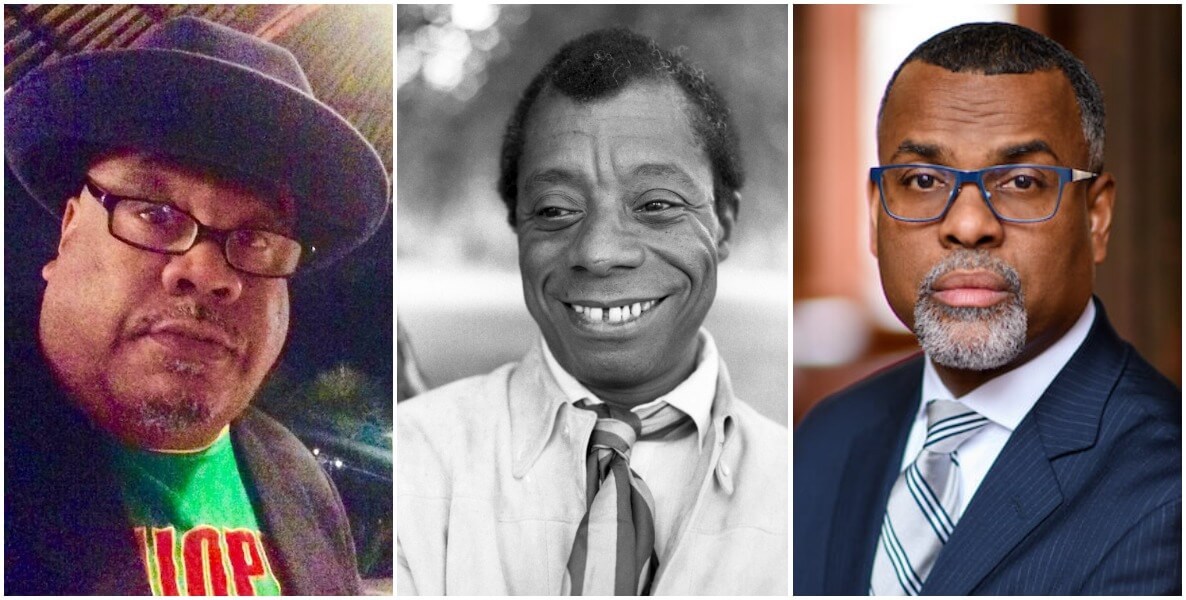“It is, alas, the truth that to be an American writer today means mounting an unending attack on all that Americans believe themselves to hold sacred,” James Baldwin—arguably the GOAT of American Letters—wrote nearly 60 years ago. “It means fighting an astute and agile guerrilla warfare with that American complacency which so inadequately masks the American panic.”
In his bestselling consideration of the great author and public intellectual, Begin Again: James Baldwin’s America and its Urgent Lessons for Our Own, Princeton Professor Eddie Glaude Jr. gives us Baldwin, the writer as righteous beacon whose fiery wisdom can redeem a nation—if only we’d listen. “Baldwin’s view of the writer was a decidedly moral one,” Glaude writes. “The writer puts aside America’s myths and legends and forces a kind of confrontation with the society as it is, becoming a disturber of the peace in doing so.”
Well, get ready for peace disturbances, Philly, ‘cause both Glaude and Tony-winning playwright and singer/songwriter Stew, who represent the Baldwin creed in all their captivating, in-yo’-face work, will be the highlight of our pre-event before this year’s Ideas We Should Steal Festival presented by Comcast NBCUniversal.
Glaude’s tearful commentaries on cable TV during the darkest moments of the Trump years were a kind of balm, outrage carefully leavened with a faith in a brighter tomorrow. And Stew? Have you seen Passing Strange, the story in rollicking song of Stew’s own search for identity, racial and otherwise? It’s a celebration of Baldwin-like intellectual iconoclasm, as was his tribute to Baldwin, Notes of a Native Song, five years ago. Like Baldwin, both Glaude and Stew take seriously the role of the artist in society: To speak the hard truths others won’t or can’t say.
Baldwin was impossible to categorize, once telling The Paris Review, “On one side of town, I was an Uncle Tom, and on the other the Angry Young Man.” Black Panthers considered him a traitor, Martin Luther King, Jr. prohibited him from speaking a the March on Washington, and J. Edgar Hoover considered him a threat to the nation. “A real writer is always shifting and changing and searching,” he once wrote. He rejected labels of all kinds; to him, race was first and foremost a social construct. “Color is not a human or a personal reality,” he wrote. “It is a political reality.”
Baldwin was the freest of free thinkers; no idea was unworthy of inspection. What a contrast to today, when what passes for public debate consists of dueling talking points, polarized sides always in their respective corners. On race, Baldwin went beyond chronicling grievance and instead wrote empathetically but unsparingly about Whites, and focused on the deeper meanings of racism: “Whatever white people do not know about Negroes reveals, precisely and inexorably, what they do not know about themselves,” he wrote in The Fire Next Time.
Glaude and Stew—moderated by MSNBC host Ali Velshi—will channel for us Baldwin’s moral instructions for these perilous times, Glaude in lyrical oration and Stew in acoustic song. It will be love-laden, uplifting, and, hopefully, at times a little uncomfortable. Jimmy would have had it no other way.
Check out Glaude here, on Baldwin’s impact on his own life:
And here’s Stew, doing the same:
Finally, if we’re lucky, maybe we can get Stew to play my favorite song from his oeuvre, Black Men Ski:
(L-R) Stew, James Baldwin (Allan warren, CC BY-SA 3.0, via Wikimedia Commons) and Eddie Glaude Jr.


